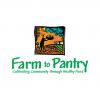Farm to Pantry is nourishing their local community and healing the planet through the prevention of food waste.
The MISSION of Farm to Pantry is to bring together communities to end food injustice and reverse global warming by rescuing and sharing locally-grown food with those who have been systematically marginalized.
Why is it important?
In 2008, Farm to Pantry was launched to serve a need in their Sonoma County community: to provide a continuous supply of fresh, healthy produce to their most vulnerable neighbors who lack access to it by cultivating a community of growers and volunteers.
The environmental impact of Farm to Pantry’s efforts is significant. By rescuing food that would otherwise be wasted, Farm to Pantry helps reduce the eight percent of global greenhouse gas emissions that food waste accounts for annually.
Food rescue keeps methane-producing material out of our air and ensures nutritious food access to our struggling community members. Up to 40 percent of all food in the U.S. ends up in landfills. By diverting food waste from landfills, methane pollution is prevented from entering the atmosphere; in 2021, they spared the air of 361 metric tons of carbon dioxide, which is equivalent to the greenhouse gas emissions of 44 homes over a year or taking more than 77 cars off the road for a year.
In the U.S., 40 percent of food is wasted when 6.1 million US children live in food-insecure households.
How do they do it?
Farm to Pantry gleans produce to reduce food insecurity, and by doing so, positively impacts the environment. Gleaning is the act of collecting leftover crops from farmers' fields after they have been commercially harvested or on fields where it is not economically profitable to harvest. Gleaners will also collect donated leftover produce from backyard growers and farms. Since 2008, they have delivered over 4 million servings of fruits and vegetables.
California farmers have seen their markets decrease by 50 percent, leaving them with excess produce and commodities for which they cannot find buyers. Restaurants and large foodservice institutions, like schools and offices, are no longer consistent clients. Simply put, many California farmers are struggling to keep their farms. Farm to Pantry was one of the original partners for the Growing the Table initiative in Sonoma County.
They delivered over 15,000 boxes in 2020 - small farmers were paid, hungry people were fed, and their team of volunteers loved being involved. Their weekly produce boxes are assembled at FEED Sonoma in Petaluma, then delivered to food-insecure families at low-income housing units and other distribution sites around the County.
One of the Farm to Pantry mantras is, “zero hungry, zero waste.” When they glean a property, they only give their clients the best quality produce. The food that does not meet their quality standards still has a home. They continually work with a few Sonoma County ranchers who use this unfit produce to feed their animals. Continuing with this mantra, every Saturday, some volunteers go to farmers markets in Sonoma County to collect the unsold produce from generous farmers and deliver it to those in need.
How you can #TravelKindly:
- Choose the Farm to Pantry as your local charity when you book your hotel with Kind Traveler.
- Join Team Glean for an out-of-the-ordinary team-building and bonding activity. All the tools and training will be provided for this 3-hour service adventure, and it’s a beautiful outdoor, stress-relieving experience while giving back to the community you are visiting.
- Sign up for a gleaning experience for yourself and/or your family to explore beautiful properties and farms in Sonoma County while fighting food insecurity and solving food waste.
- Try some of the healthy Farm to Pantry recipes created by the organization's Executive Director, who also happens to be a Food Network Celebrity Chef. Duskie Estes has a simple recipe for even the most esoteric and intimidating fruits and vegetables!
Your $10 Will...
provide 20 servings of Sonoma County-grown fruits + vegetables to marginalized families
save the emissions equivalent to taking one car off the road for half a day
provide sanitizer for a week for gleaning teams

